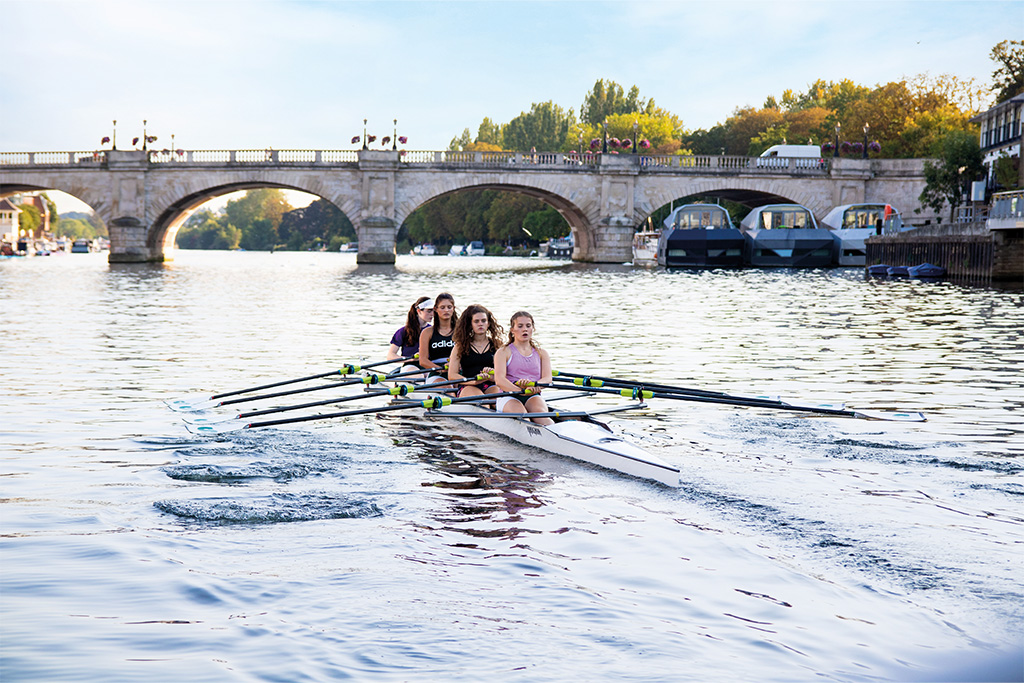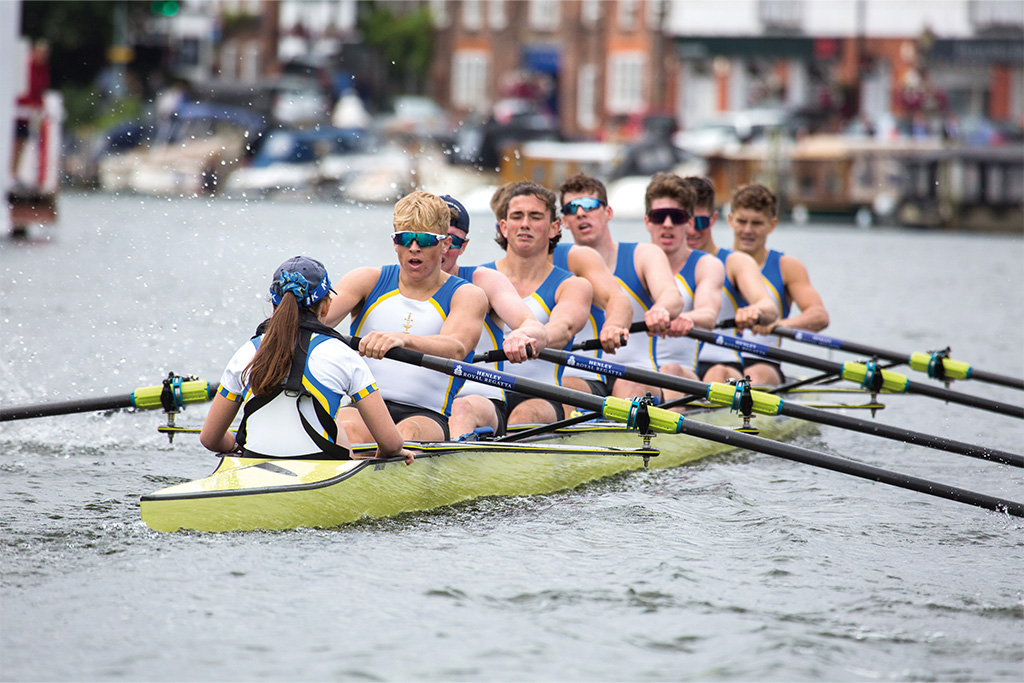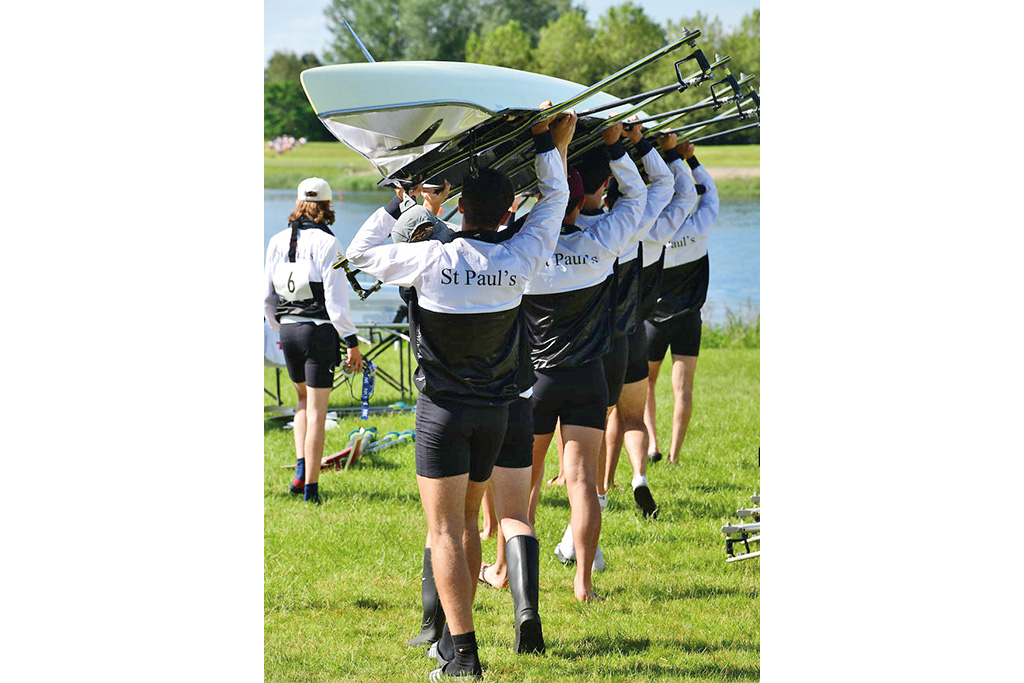Match Fit: Rowing
By
3 years ago

It’s good for mind, body, and even your social life, says Sally Jones. No wonder rowing is a sport increasing in popularity. So how and where to get started?

National Schools Regatta, Dorney Lake, 2017: the eight crews took to water for the final of the prestigious Championship Eights. With little between the crews in the opening stages, the ‘usual suspects’ Eton College, past winners, plus St Paul’s School, Hammersmith, looking for their first victory in the championship, gradually edged ahead of their rivals.
In the middle of the course, it was neck-and-neck between the two leaders, but then the spectators watched, mesmerised, as St Paul’s inexorably inched into a narrow lead and glided to the title after one of the greatest displays of youth rowing, with Eton second and Shiplake College just holding off Winchester and Radley for third place.
St Paul’s winning ways continued with a hat trick of National Schools victories in consecutive years plus a coveted victory in 2018 at the Henley Royal Regatta, the blue riband event of schoolboy rowing, where they became the fastest schools crew in history. This run of success underlined their strength in the sport so often dominated by the big traditional boarding schools like Radley, Shrewsbury and Eton.
These days several girls’ and co-ed schools are also producing outstanding results, among them Headington School, Surbiton High and Shiplake College. Punching above its weight is St Edward’s, Oxford, which recently became the first co-ed school to get both its boys’ and girls’ crews into the semi-finals at Henley.
It is no coincidence that St Paul’s Director of Rowing, Bobby Thatcher, and Adam Moffatt, Head of Rowing at St Edward’s, are each highly experienced coaches and former internationals. Both believe in smart rather than exhaustive training; their 1st VIIIs do half the weekly mileage of most of their main rivals, but with the emphasis on technique, tactical nous and enjoyment, and seem the stronger for it.

Rowing has always possessed undeniable social cachet: think balmy days of Pimms and summer frocks at Henley, and Eton’s flower-decked oarsmen at the Fourth of June Procession of Boats. The sport carries tangible benefits, too. The all-round physical workout, mental discipline and stamina required make it an effective training for mind and body. Adam Moffatt also believes the teamwork required can transform newcomers’ school experience.
‘We row a lovely stretch of river at Godstow, watched by cows and horses,’ Moffatt explains. ‘The beautiful countryside is stunning for our rowers’ minds – a special, calming place, separate from school life. One un-sporty student was shy, quiet and finding it difficult to fit in. She joined the rowing club, trained hard and made the 1st VIII – but she also made friends for life and loved the training. It’s been the making of her.’
He adds: ‘It’s vital for our pupils to balance being a teenager with being an athlete. Rowing can provide an added focus but primarily they must enjoy being a teenager and a student first – and a happy rower is more likely to go fast!’
Ryan Demaine, Performance Director and Head of Rowing says team mentality is crucial. ‘There’s no magic silver bullet. You need a supportive network of teachers, pastoral team and coaches who believe in you and you need to surround yourself with like-minded people who are not afraid of hard work, grit and determination. Perhaps most importantly, the rowers themselves must be well-organised.’
St Paul’s crews are mostly ‘bright, impressive boys with an excellent work ethic’, says Bobby Thatcher, whose coaching partnership with the legendary veteran Donald Leggett – coach to numerous Cambridge Boat Race crews – has proved successful. ‘They study to a high level and have to be very organised, good at getting things done and with phenomenal time management.’
Rowing excellence translates into opportunities. Four of St Paul’s 2018 crew went to Harvard, two to Princeton and another, Ollie Parish, is currently stroking the Cambridge Blue Boat. ‘The Ivy League universities don’t offer scholarships, but provide needs-based financial aid,’ explains Thatcher. ‘Being a high-level sportsman or woman can get bright youngsters recruited, though.’
Moffatt adds: ‘Financial support can be worth tens of thousands a year. These opportunities can set you up for life.’

Ones to Watch
St Paul’s School
Alp Karadogan, 15, a 6.9ft prodigy who rowed for the St Paul’s 1st XIII aged 14, is stronger than many senior male internationals. ‘His raw power and change of pace are astounding,’ says Bobby Thatcher. ‘I’ve never seen anything like it.’ Other Paulines predicted to excel are: Felix Peerless, 15, Philip Wolfensberger, 16, and Captain of Boats Sebastian Marsoner, 18.
St Edward’s, Oxford
Josh Brangan, 18, a GB U19 international is off to Harvard on a rowing scholarship. His five crewmates trialling for GB junior squads are: U6th-former Max Ebner, Scott Bain, Isaac Hillicks, William White and Rory McDonnell, (all L6th). In the girls’ squad are Hermione Brewster and Roxy Welford, both 17, with excellent technical ability.
Inspirational Books on Rowing
A Most Beautiful Thing by Arshay Cooper
The moving true story of a group of young men from troubled backgrounds, growing up in the 1990’s on Chicago’s West side who form America’s first all-black high school rowing team. Their exploits radically alter the sport – and transform their lives.
The Boys in the Boat by Daniel James Brown
An account of the 1936 University of Washington Eight and their quest for Olympic gold. The sons of loggers, shipyard workers and farmers, they defeated US Ivy League and British universities and finally Hitler’s elite German crew at the Berlin Olympics.
The Resources
Sculling courses
Lots of schools encourage their youngsters to learn sculling in a single or double scull as a fast-track way of improving their overall skills and competitiveness. (Sculling involves rowing with two oars, in narrower, more precarious craft, than a quad or an eight.)
‘You learn far more about rowing in a short time through sculling than you do through years in Eights,’ explains Moffatt. ‘It shows your individual impact and gives you quick feedback on your technique and power.’ Find a course via www.britishrowing.org
Micropore tape and nappy rash cream
Many young rowers are prone to blisters on their hands from the repetitive action of the strokes, so micropore tape is widely used to protect the skin and enable blisters to heal.
Thatcher also swears by an unexpected remedy. ‘One friend recommended a German nappy rash cream, Penaten,’ he explains, ‘and it really works. Rubbing it on your palms before you row stops the friction between your hands and the oars and it helps even newcomers avoid blisters and infections which can be really painful, particularly when you’re training in the cold and wet.’
READ MORE
Match Fit: Tennis from Spring Summer 2022



